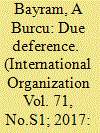|
|
|
Sort Order |
|
|
|
Items / Page
|
|
|
|
|
|
|
| Srl | Item |
| 1 |
ID:
153559


|
|
|
|
|
| Summary/Abstract |
Why are some politicians guided by a sense of obligation toward international law but others are not? Why do some politicians have a social as opposed to an egoistic preference over compliance with international legal rules? Existing approaches largely assume that the structural features of the compliance environment shape preferences. As a result, they neglect the heterogeneity across decision makers' subjective beliefs in the legitimacy of international law, which is critical for explaining who exhibits a sense of obligation and has a non-egoistic preference for compliance. Drawing upon a large body of psychological research on social identity and influence, I argue that obligation toward international law has a behavioral foundation shaped by cosmopolitan social identity. Using data from an original survey of German politicians that includes two compliance experiments, I show that politicians with a high degree of cosmopolitanism are driven by a sense of legal obligation that results in a social preference for compliance while those low on cosmopolitanism lack the same sense of normative respect. Replicated in a second experimental study conducted with a convenience sample, my results indicate that strategic rationality in compliance applies, but only to a particular set of actors. By illuminating the psychological underpinnings of obligation toward international law, this study contributes to a richer understanding of compliance preferences and builds a bridge between instrumental and normative models.
|
|
|
|
|
|
|
|
|
|
|
|
|
|
|
|
| 2 |
ID:
132755


|
|
|
|
|
| Publication |
2014.
|
| Summary/Abstract |
Struggling to navigate a world that is increasingly shaped by legal rules and obligations, most ordinary Americans lack real access to courts. Often this means simply forgoing legal rights and entitlements or giving up in the face of claims of wrongdoing. Among those who cannot avoid courts-such as those facing eviction, collection, or foreclosure and those seeking child support, custodial access, or protection from violence or harassment-the vast majority (as many as 99 percent in some cases) find themselves in court without any legal assistance at all. There are many reasons for this lack of meaningful access, including the underfunding of courts and legal aid, but perhaps the most fundamental is the excessively restrictive American approach to regulating legal markets. This regulation, controlled by the American legal profession and judiciary, closes off the potential for significant reductions in the cost of, and hence increases in access to, courts. Unlike the problem of funding, that is a problem that state courts have the power, if they can find the judicial will, to change.
|
|
|
|
|
|
|
|
|
|
|
|
|
|
|
|
| 3 |
ID:
132507


|
|
|
|
|
| Publication |
2014.
|
| Summary/Abstract |
Ratifying core conventions adopted by the International Labor Organization (ILO) creates legal obligations to improve labor standards in the domestic economy, notably with regard to union rights, minimum age and discrimination in employment, and forced labor. Why and when do states choose to ratify them? Two influential theoretical approaches lead to the expectation that states are influenced by the ratification behavior of other states. Drawing on rationalist institutionalism, the authors expect states to use institutions such as the ILO to improve or consolidate their preferred standards domestically while reducing the risk of suffering competitive disadvantages in world markets. In this view, ILO conventions are devices for the prevention and mitigation of regulatory races to the bottom among trade rivals. Drawing on sociological institutionalism, they expect states to ratify ILO conventions if doing so conforms to a norm of appropriate behavior that is prevalent in a state's peer groups. This article develops observable implications of these hypotheses and tests them by applying spatial regression models to seven core ILO conventions and 187 countries between 1948 and 2009. The analysis yields strong evidence in support of both hypotheses.
|
|
|
|
|
|
|
|
|
|
|
|
|
|
|
|
|
|
|
|
|